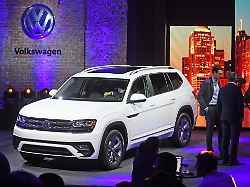Supply chains still under pressure
VW and BMW are selling more cars in the US
04.10.2022, 06:40 am
In the US, automakers are still struggling to supply their factories with the necessary components. But there are also rays of hope, for example at General Motors. Some of the German manufacturers are also reporting increases.
Persistent supply chain problems such as a lack of computer chips continue to slow down the US auto market. Thanks to the high demand for larger vehicles such as city SUVs and pick-up trucks, some manufacturers were still able to post significant sales increases in the third quarter. In the three months to the end of September, Volkswagen increased sales by 12.0 percent to 88,820 new vehicles compared to the same period last year. The main reason was strong SUV business with the Atlas, Tiguan and Taos models, as VW announced on Monday. Since the beginning of the year, sales have nevertheless fallen by 20.1 percent.
Volkswagen’s subsidiary Porsche claims to have increased US sales in the third quarter by 8.5 percent to 16,581 cars. BMW also recently increased its sales in the important US market. In the past three months, BMW delivered 78,031 new cars of its core brand there, increasing sales by 3.2 percent year-on-year. The subsidiary Mini increased by 11.4 percent to 7178 vehicles, as BMW announced. Despite the positive quarterly development, BMW’s US sales have fallen by a total of 5.3 percent since the beginning of the year. The second brand Mini is down 13.1 percent after nine months.
Even if not all manufacturers have presented their figures for the past quarter, the US industry leader General Motors (GM) with brands such as Chevrolet, Buick and Cadillac is already one of the big winners. GM boosted sales in its home market by 24 percent to 555,560 vehicles thanks to improved chip supply, keeping rival Toyota at bay for the second quarter in a row.
With the Japanese, US sales fell by 7.1 percent to 526,017 cars. The international industry giant Stellantis also had to cope with a significant decline. Sales at Honda even fell by 36 percent, and Nissan sold 23 percent less.
